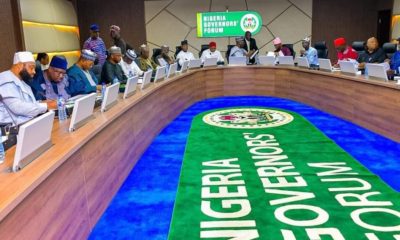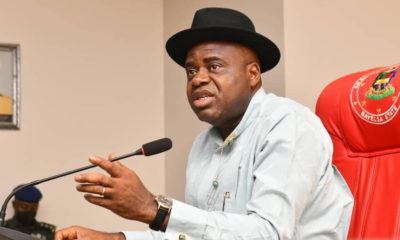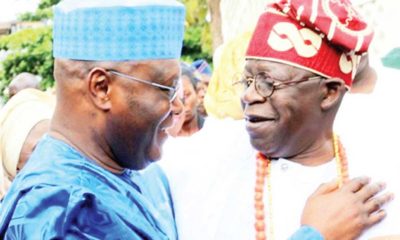Politics
Ibori Bombs Supreme Court, APC
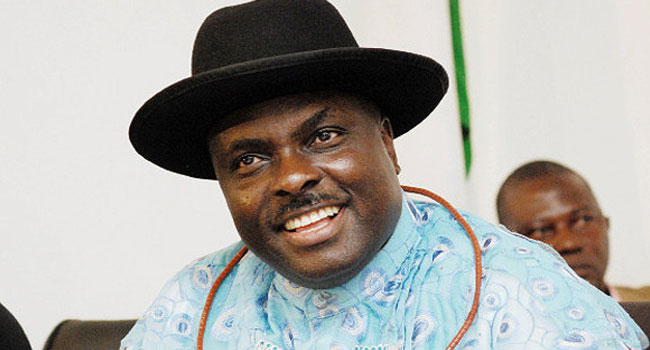
Former governor of Delta State, James Onanefe Ibori has come down hard on the Supreme Court of Nigeria (SCN) and the ruling All Progressives Congress (APC) over the fiscal autonomy granted to Nigeria’s 774 Local Government Areas.
Following the handing down of the SCN’s decision on the matter on Thursday, the publisher of Daily Independent took to his verified X handle to vent his disappointment at the architects of what he termed “a severe setback on the principle of federalism” as enshrined in the Constitution.
Ibori could not hide his anger at the SCN’s decision, which he stated ran contrary to section 162(3) of the 1999 Constitution (as amended).
In the tweet, which was signed with his full names, James Onanefe Ibori, he wondered why the apex court should turn blind eyes to section 162(6) of the constitution which states that, “Each State shall maintain a special account to be called “State Joint Local Government Account” into which shall be paid all allocations to the Local Government Councils of the State from the Federation Account and from the Government of the State.”
It is the considered opinion of the respected godfather of Delta politics that “The court’s ruling on the matter is an assault on true federalism.”
READ ALSO: BREAKING: Supreme Court Grants LGAs Autonomy
He expressed optimism that the ruling would be reviewed sooner than later to right the wrongs.
“It is my sincere hope that the judgement delivered today will be reviewed at the earliest time possible because it clearly stands the concept of federalism on its head,” he stated.
Ibori wrote, “The Supreme Court has dealt a severe setback on the principle of federalism as defined by section 162(3) of the 1999 Constitution (as amended). The section expressly provides thus:
“Any amount standing to the credit of the Federation Account shall be distributed among the Federal and State Governments and the Local Government Councils in each State on such terms and in such manner as may be prescribed by the National Assembly”.
“Sections 6 provide further clarity on the subject matter.
(6) Each State shall maintain a special account to be called “State Joint Local Government Account” into which shall be paid all allocations to the Local Government Councils of the State from the Federation Account and from the Government of the State.
“The court’s ruling on the matter is an assault on true federalism. The federal government has no right to interfere with the administration of Local Governments in under any guise whatsoever. There are only two tiers of government in a federal system of government.
“I’m opposed to fiddling with the allocations to the Joint LG Accounts at the state level but that in itself does not call for this death knell to the clear provisions of section 162 of the constitution. The implications of the ruling are far reaching and the issues that readily come to mind are:
“1. Constitutional Interpretation: The Supreme Court’s ruling appears to contradict the explicit provisions of Section 162 of the 1999 Constitution. This raises questions about judicial interpretation and whether the court has overstepped its bounds in reinterpreting clear constitutional language.
“2. Balance of Power: The ruling potentially shifts the balance of power between the federal government and states. By allowing federal intervention in local government finances, it arguably centralizes more power at the federal level, contrary to the principles of federalism.
“3. State Autonomy: This decision could be seen as an erosion of state autonomy. States are meant to have significant control over their internal affairs, including the administration of local governments, in a federal system.
“4. Financial Independence: The ruling may impact the financial independence of states and local governments. If the federal government can directly intervene in local government finances, it could potentially use this as a tool for political leverage.
“5. Precedent Setting: This decision could set a precedent for further federal interventions in areas traditionally reserved for state governance, potentially leading to a more centralized system of government over time.
“That Local Governments must be “democratically elected” goes without saying. Yes, I agree, that’s the position of the constitution but withholding their allocation is not the way to go. It’s wrong.
“In the coming days, we will begin to fully understand the implications of the Supreme Court decision. An assault on the constitution is not the answer to fiddling with the Joint LG Account. If the ruling is saying Governors cannot temper, touch, fiddle with the Joint Accounts, that’s fine because they shouldn’t be doing that in the first place. But asking the Federal Government to pay Local Governments allocations to the account of the Local Government directly will lead to utter chaos and avoidable friction in governance.
“Like the Hon. Justice Oputa JSC of blessed memory once said in describing the Supreme Court ” we are not final because we are infallible, but we are infallible only because we are final”.
“It is my sincere hope that the judgement delivered today will be reviewed at the earliest time possible because it clearly stands the concept of federalism on its head.”
Politics
Edo Considers Arresting Sponsors Of Armed PDP Thugs

With the wave of insecurity unrelenting and the belief that it has a political undertone, the Edo State Government is contemplating arresting those sponsoring what it described as ‘touts in possession of over 5,000 illegal arms in Edo State’.
This was detailed in a press statement on Sunday in Benin City by the Chief Press Secretary to the Edo State Governor, Fred Itua.
According to Itua, the state government would no longer condone the menace of illegally armed political thugs and touts, so would not hesitate to unveil the mask to pick up those behind the non-state actors of a particular political party, disturbing the peace of the state.
He wrote, “The Edo State Government is gravely concerned about the rising wave of insecurity fuelled by armed thugs and criminal elements associated with the opposition Peoples Democratic Party (PDP).
ALSO READ: Ohanivo Upbeat As Sen Umahi Emerges Silverbird’s Most Outstanding Minister Of The Year
“These individuals, who were heavily armed before the 2024 Edo Governorship Election, have refused to surrender their weapons, posing a clear and present danger to the safety of our citizens.
“It is on record that former Governor Godwin Obaseki, before the last election, openly threatened that “Nigeria would burn.” This was not a mere political outburst — it was a premeditated declaration backed by the systematic arming of touts and thugs.
“These individuals, many of whom were drafted into the Edo State Security Network under the previous administration, still possess over 5,000 illegal firearms, which they now use to perpetrate robbery, kidnapping, and violent attacks across the state.
“The Edo State Government is aware that PDP leaders, who had direct control over these armed operatives, have refused to assist in disarming them. Instead, they continue to shield these criminals, providing them with cover as they unleash terror on innocent citizens.
“Worse still, intelligence reports indicate that PDP leaders are stockpiling additional arms, with the intention of orchestrating mayhem should their candidate, Asue Ighodalo, fail to secure victory at the Tribunal.
“The State Government is calling on all security agencies to intensify their investigations, track down these armed criminals, their sponsors and bring them to justice.
“No individual, regardless of political affiliation, is above the law, and Edo State, under the leadership of Governor Monday Okpebholo, will not tolerate any attempt to destabilize the peace and security of our people.
“We urge law enforcement agencies to move swiftly and ensure that all illegally possessed firearms are recovered, and those responsible for the current state of insecurity in Edo are held accountable.
“The security and well-being of Edo people remain Governor Okpebholo’s utmost priority, and he will not allow politically sponsored violence to take root in our State.”
Politics
JUST IN: Jandor Dumps PDP, Returns To APC
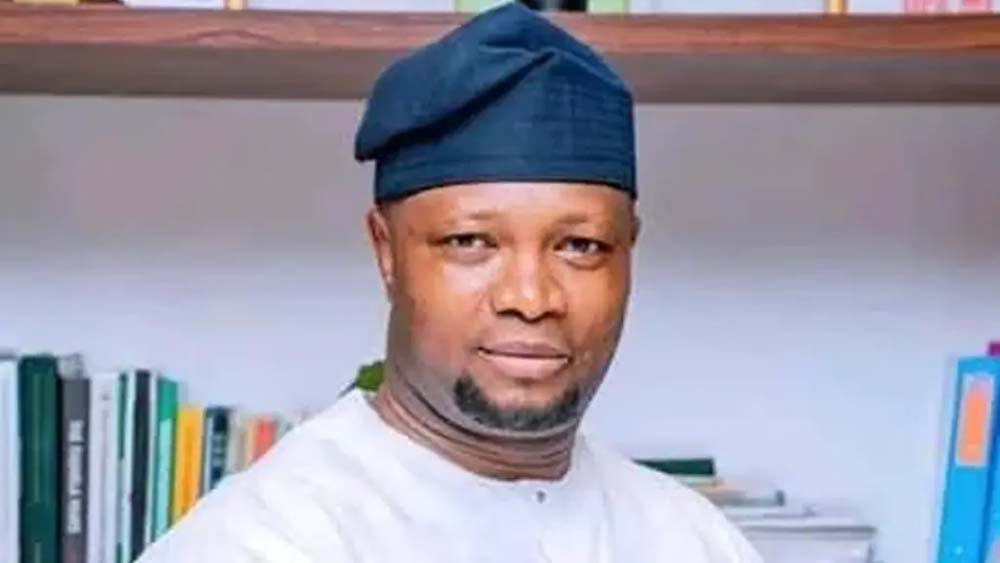
Former Lagos State governorship candidate of the Peoples Democratic Party (PDP), Dr. Abdul-Azeez Adediran, popularly known as Jandor, has officially defected to the All Progressives Congress (APC).
Jandor announced his return to the ruling party on Monday during a press conference at his office in Ikeja, Lagos.
His decision comes weeks after resigning from the PDP, citing internal crises and a lack of party discipline as key reasons for his departure.
READ ALSO: Ex-Lagos PDP Flagbearer Jandor Dumps Party
“Our story in the PDP was a case of working with perennial political saboteurs,” Jandor stated. “We have resolved to love our future much more than we hate our past.”
According to Jandor, the PDP’s failure to address anti-party activities during the 2023 general elections led to his decision. He expressed frustration over what he described as a pattern of betrayal within the party.
He also emphasized that his move to the APC followed extensive consultations with family, political associates, elder statesmen, and well-meaning Lagosians.
“The primary reason a political party exists is to win elections and form a government to serve the people. We have decided to join a party that prioritizes winning for its members, regardless of who is on the ballot,” he said.
Before settling for the APC, Jandor revealed that he engaged in discussions with leaders from other political parties, including the Social Democratic Party (SDP), African Democratic Congress (ADC), and Young Progressive Party (YPP).
Addressing concerns about his previous exit from the APC, Jandor likened his political journey to a Yoruba adage about learning from different experiences.
“In APC, we have a leader who, even if you fault his choices, is determined to win for the party and its members. In Lagos PDP, however, we had a leader who, at every election cycle, worked against his own party and dashed the hopes of many,” he said. “We have chosen the better alternative.”
Jandor acknowledged the role of key figures in persuading him to rejoin the APC, particularly President Bola Tinubu’s Chief of Staff, Femi Gbajabiamila, and Tinubu’s son, Seyi Tinubu.
“I must recognize the relentless efforts of Rt. Hon. Femi Gbajabiamila, who has been on my case for over a year to return home and join hands with Mr. President,” he said. “Upon hearing of my resignation from the PDP, Seyi Tinubu immediately reached out and urged me to come back home.”
Jandor assured his supporters that his move was in Lagos’ best interest and urged them to follow him into the APC.
“We remain committed to the values of service, integrity, and progress. Together, we will continue to champion the cause of a better Lagos for present and future generations,” he declared.
Politics
No Political Gang-Up Can Stop Tinubu’s Re-Election In 2027 – APC Chieftain

A chieftain of the All Progressives Congress (APC), Olatunbosun Oyintiloye, has dismissed fears that recent defections from the ruling party will affect President Bola Ahmed Tinubu’s chances of securing re-election in 2027.
Speaking in Osogbo on Sunday, Oyintiloye described the ongoing political realignments as inconsequential, insisting that Tinubu has a “winning strategy” to counter any opposition at the right time.
His comments come amid reports that former Kaduna State Governor, Nasir El-Rufai, has defected to the Social Democratic Party (SDP) and is reaching out to former APC stalwarts, including Rauf Aregbesola, to join him.
READ ALSO: El-Rufai Abandons APC, Says Party No Longer Represents Progressives
Despite this, Oyintiloye maintained that defections are a normal part of politics and would not derail the president’s re-election bid.
“Take it or leave it, no amount of political gang-up can stop the re-election of President Tinubu in 2027. Those who are gathering against him should study the kind of person he is,” Oyintiloye said.
He further argued that Tinubu’s achievements, political acumen, and goodwill across the country would secure him victory in the next election. According to him, the president is making deliberate efforts to put Nigeria on the path of greatness, and these efforts are already yielding positive results.
“The president will succeed, and his political enemies will soon realise their mistake in opposing him,” he added.
While expressing confidence in Tinubu’s chances, Oyintiloye urged the president to intensify public engagement and sensitisation efforts to showcase his administration’s achievements and future projections.
With political tensions rising ahead of the 2027 elections, Tinubu’s camp remains optimistic about his chances, despite defections and emerging opposition alliances.

